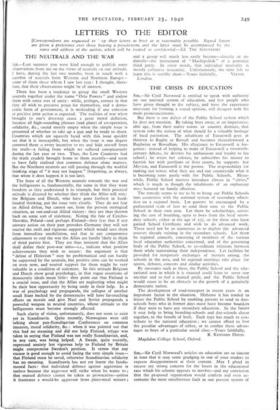LETTERS TO THE EDITOR [Correspondents are requested to -ep their
letters as brie! as is reasonably possible. Signed letters are given a preference over those bearing a pseudonym, and the latter must be accompanied by the name and address of the author, which will he treated as confidential.—Ed. THE SPECTATOR]
THE NEUTRALS AND THE WAR
SIR,—Last summer you were kind enough to publish some observations from me on the views of neutrals on our attitude. I have, during the last two months, been in touch with a number of neutrals from Western and Northern Europe— some of them those whom I saw last year : I thought, there- fore, that their observations might be of interest.
There has been a tendency to group the small Western neutrals together under the name " Oslo Powers " and endow them with some sort of unity : while, perhaps, correct in that they all wish to preserve peace for themselves, and a demo- cratic form of government, it is misleading if any cohesion or positive joint action is expected. The realities of war when brought to one's doorstep cause a great moral deflation, because all high-sounding phrases (and plans) of co-operation, solidarity, &c., sound merely empty when the simple issue is presented of whether to take up a gun and be ready to shoot. Countries which are squarely faced with this issue quickly see that it is inescapable, but when the issue is one degree removed there is every incentive to try and hide oneself from the truth—a failing from which we suffered conspicuously during the last year or two. Thus, the Low Countries had the truth crudely brought home to them recently—and seem to have fully realised that common defence alone matters. But the Northern neutrals are still passing through the wishful thinking stage of " it may not happen " (forgetting, as always, that when it does happen it is too late).
The hope of all the Western neutrals towards the war and the belligerents is, fundamentally, the same in that they want freedom as they understand it to triumph, but their practical attitude is dictated by whether they think the Allies will win: the Belgians and Dutch, who have gone farthest in hard- headed thinking, put the issue very clearly. They do not fear an Allied defeat, but cannot see, from the present strategical situation, an out-and-out Allied victory: they are thus thrown back on some sort of stalemate. Noting the fate of Czecho- Slovakia, Poland—and perhaps Finland—they fear that if any unwary action on their part provokes Germany they will not receive the swift and vigorous support which would save them from immediate annihilation, and that in any compromise adjustment to end the war the Allies are hardly likely to think of third parties first. They are thus insistent that the Allies shall define their post-war aims—i.e., indicate what positive achievements they wish to secure: the argument is that " defeat of Hitlerism " may be problematical and can hardly be supported by the neutrals, but positive aims can be worked on even now, and neutral support for them might be very valuable in a condition of stalemate. In this attitude Belgians and Dutch show good psychology, in that vague assertions of democratic ideals mean little: they point out that Finland is a crucial issue, and that the Allies are neglecting what might be their best opportunity by being tardy in their help. In a war of psychology and propaganda, the collapse of another small State backed by the democracies will have far-reaching effects on morale and give Nazi and Soviet propaganda a powerful weapon in neutral countries, whose attitude to the belligerents must become strongly affected.
Such clarity of vision, unfortunately, does not seem to exist yet in Scandinavia Quite recently, Norwegians were still talking about pan-Scandinavian Conferences on common interests, moral solidarity, &c.: when it was pointed out that this had no meaning and did not help Finland, refuge was taken in saying that Finland was not really Scandinavian, and, in any case, was being helped. A Swede, quite recently, expressed anxiety lest vigorous help to Finland by Britain might compromise Sweden's position. It seems that any excuse is good enough to avoid facing the very simple issue— that Finland must be saved, otherwise Scandinavian solidarity has no meaning. Scandinavia has not yet learnt the funda- mental facts: that individual defence against aggression is useless because the aggressor will strike when he wants to ; that mutual defence cannot be taken as provocative—unless it frustrates a would-be aggressor from piece-meal seizure ;
and a group will much less easily become—directly or in- directly—the instrument of " Machtpolitik " of a powerful third party. In other words, that individual neutrality is merely collective insecurity. Unfortunately, the time left to






































 Previous page
Previous page